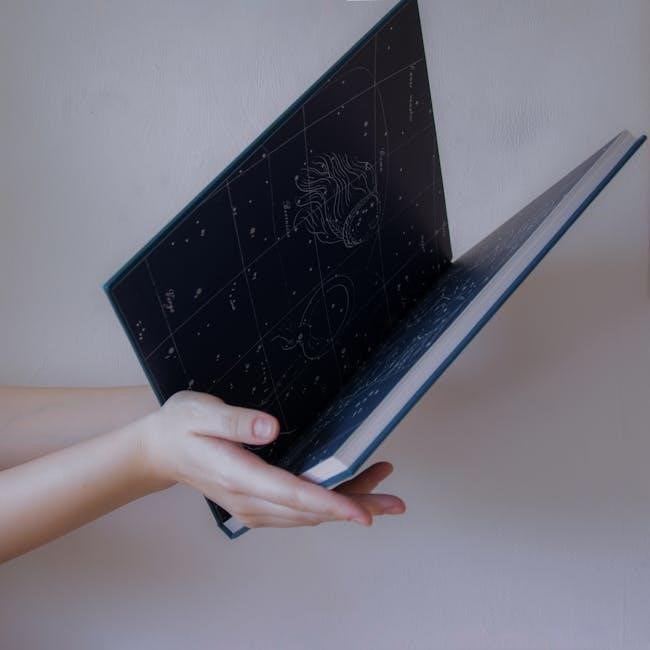cosmos and psyche – book pdf
This groundbreaking book by Richard Tarnas explores the profound connection between cosmic cycles and human experience, offering insights into astrology, history, and the evolution of consciousness.
Overview of the Book and Its Significance
Cosmos and Psyche: Intimations of a New World View by Richard Tarnas is a groundbreaking work that explores the deep interconnectedness between celestial movements and human history. Tarnas, a renowned scholar, demonstrates how planetary cycles correspond to major historical events and cultural transformations, offering a fresh perspective on the nature of time and human consciousness. This book is significant for its integration of astrology, depth psychology, and historical analysis, challenging conventional views of causality and the human condition. It bridges the gap between science and spirituality, proposing a new paradigm for understanding the cosmos and the psyche. By examining archetypal patterns and their influence on collective and individual experiences, Tarnas provides a compelling narrative that reshapes our understanding of the universe and our place within it. The book has garnered attention for its interdisciplinary approach and its potential to inspire a new worldview in the 21st century.
Author Background: Richard Tarnas and His Contributions
Richard Tarnas is a distinguished philosopher, cultural historian, and professor known for his work in depth psychology and the study of astrology. Born in 1950, Tarnas earned his Ph.D. in philosophy and psychology from Saybrook University. His academic career has been marked by a deep exploration of the human condition, mythology, and the intersection of psyche and cosmos. Tarnas is the founding director of the Philosophy, Cosmology, and Consciousness program at the California Institute of Integral Studies. His contributions include the development of archetypal cosmology, which posits that planetary alignments influence human affairs. Cosmos and Psyche is his most celebrated work, showcasing his rigorous research and innovative synthesis of astrology, history, and depth psychology. Tarnas’s work has been praised for its interdisciplinary approach and its potential to redefine our understanding of the universe and human existence, making him a pivotal figure in contemporary thought.

Core Concepts Explored in “Cosmos and Psyche”
The book explores cosmic patterns, planetary archetypes, and their influence on human history, synthesizing astrology with depth psychology to reveal profound connections between the universe and human consciousness.

The Connection Between Cosmic Cycles and Human Experience
Richard Tarnas explores the correlation between celestial patterns and historical events, revealing how planetary alignments mirror collective psychological and cultural shifts. He examines how cosmic cycles, such as planetary transits, correspond to pivotal moments in human history, suggesting a deep interplay between the heavens and human consciousness. By analyzing these connections, Tarnas argues that astrology offers a unique lens through which to understand the unfolding of human affairs. His work bridges the gap between the macrocosm of the universe and the microcosm of human experience, proposing that celestial movements influence collective archetypes and cultural evolution. This perspective challenges traditional views of history and psychology, inviting readers to reconsider the relationship between the cosmos and the human psyche. Tarnas’s insights provide a compelling narrative that blends science, philosophy, and spirituality, offering a fresh understanding of our place within the universe.
Planetary Archetypes and Their Role in Shaping History
Richard Tarnas delves into the concept of planetary archetypes, exploring how each planet embodies distinct symbolic themes that influence human history and culture. He argues that these archetypes—such as Mars representing conflict, Venus symbolizing love, Jupiter embodying expansion, and Saturn reflecting structure—shape collective experiences and historical events. By analyzing planetary alignments and their correlations with major historical shifts, Tarnas demonstrates how these archetypes manifest in epochs of war, cultural transformation, and scientific breakthroughs. His research reveals a statistically significant relationship between celestial patterns and terrestrial events, suggesting that planetary archetypes serve as a blueprint for understanding the evolution of human civilization. This perspective offers a deeper layer of meaning to historical narratives, highlighting the interplay between cosmic influences and human affairs. Tarnas’s work challenges readers to reconsider the role of astrology in shaping both individual and collective destiny.
The Integration of Astrology and Depth Psychology
Richard Tarnas’s work in Cosmos and Psyche seamlessly integrates astrology with depth psychology, exploring how celestial patterns reflect inner human experiences. Drawing on Carl Jung’s concept of the collective unconscious, Tarnas suggests that planetary archetypes symbolize universal themes and emotions shared across humanity. He examines how these archetypes—such as the Mother (Moon), Father (Saturn), and Trickster (Mercury)—manifest in both individual psyches and collective historical events. By aligning astrological cycles with psychological processes, Tarnas reveals a profound interplay between the cosmos and human consciousness. This integration challenges traditional views of astrology as mere superstition, instead presenting it as a tool for understanding the deeper, symbolic dimensions of human existence. Tarnas’s approach bridges the gap between the celestial and the psychological, offering a holistic perspective on the nature of reality and human experience. His work invites readers to explore the cosmic dimensions of the psyche and the psychological resonance of celestial movements;

Key Themes and Arguments in the Book
The book explores the alignment of celestial movements with historical events, the evolution of consciousness, and critiques traditional views, offering a transformative understanding of astrology’s role in human affairs.
The Correspondence Between Celestial Movements and Historical Events
Tarnas examines the alignment of planetary cycles with major historical events, revealing a statistically significant correlation between celestial movements and collective human experiences. He argues that specific planetary alignments, such as the conjunctions of Jupiter-Uranus or Neptune-Pluto, correspond to periods of profound cultural, political, and intellectual transformation. For instance, the American and French Revolutions coincided with a Jupiter-Uranus conjunction, while the rise of modernism and the women’s suffrage movement aligned with the Neptune-Pluto cycle. Tarnas supports his claims with meticulous historical research and statistical analysis, suggesting that these patterns are not mere coincidences but reflections of a deeper cosmic order. This correspondence challenges conventional views of history and offers a new perspective on the interplay between the heavens and human affairs, inviting readers to reconsider the nature of time and collective consciousness.
The Evolution of the Modern Self and Its Cosmic Implications
Tarnas explores how the modern self has evolved in tandem with cosmic cycles, revealing a profound interplay between planetary alignments and human consciousness. He argues that the development of individual identity and collective consciousness mirrors the unfolding of celestial patterns, particularly through the lens of planetary archetypes. The book examines how historical shifts, such as the Renaissance and the Enlightenment, correlate with specific astrological configurations, reflecting humanity’s growing self-awareness. Tarnas suggests that the modern self is not an isolated entity but is deeply embedded within a universal evolutionary process. This perspective challenges traditional views of human development, offering a cosmic context for understanding personal and collective transformation. By linking the evolution of the self to celestial rhythms, Tarnas opens up new avenues for exploring the nature of consciousness and its potential for future growth.
Critique of Traditional Views on Astrology and Psychology
Tarnas challenges conventional perspectives on astrology and psychology, arguing that both fields have often overlooked the profound interplay between celestial cycles and human consciousness; He critiques the reductionist tendencies in modern psychology, which frequently dismisses astrology as mere superstition, and similarly questions the superficial approaches to astrology that fail to engage with its deeper symbolic and philosophical dimensions. By integrating astrological insights with depth psychology, Tarnas offers a more holistic understanding of human experience, revealing how planetary archetypes shape both individual and collective unconscious patterns. His work underscores the limitations of traditional views and proposes a more nuanced framework for exploring the intersections of cosmos and psyche. This critique not only revitalizes astrology but also expands the scope of psychological inquiry, encouraging a more integrated and multidisciplinary approach to understanding human nature.

Practical Applications and Implications
Astrological insights offer practical tools for personal growth and societal transformation, integrating depth psychology to foster a new, interconnected worldview for the 21st century.
How Astrological Insights Can Inform Human Understanding
Richard Tarnas’s work in Cosmos and Psyche reveals how astrological patterns mirror human experiences, offering a deeper understanding of historical events and cultural evolution. By examining planetary archetypes, Tarnas demonstrates how celestial movements correlate with collective psychological themes, such as the Jupiter-Saturn cycle reflecting societal shifts. This integration of astrology and depth psychology provides a framework for interpreting human history through a cosmic lens, enabling individuals to connect personal and collective experiences. The book suggests that astrological insights can empower self-awareness, fostering a holistic view of human existence. Tarnas’s approach challenges traditional scientific and psychological paradigms, inviting readers to reconsider the interplay between the cosmos and human consciousness. Ultimately, this perspective offers practical tools for navigating life’s challenges and understanding the broader cosmic context of human evolution.
The Potential for a New World View in the 21st Century
Richard Tarnas’s Cosmos and Psyche proposes a revolutionary shift in how humanity perceives its place within the universe, blending astrology, psychology, and history. By linking celestial patterns to human experiences, the book challenges traditional scientific and philosophical frameworks, offering a more integrated understanding of existence. This new world view encourages a holistic perspective, where cosmic cycles and archetypes are seen as active forces shaping human history and individual consciousness. Tarnas’s ideas invite a reevaluation of modern thought, suggesting that astrology, often dismissed as superstition, holds profound insights into the collective psyche and societal evolution. As the 21st century grapples with complexity and uncertainty, Cosmos and Psyche provides a transformative lens through which to view the interconnectedness of all things, inspiring a deeper harmony between humanity and the cosmos.


